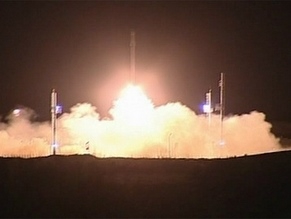|
World Jewish News

Launch of Iraninan Navid satellite, Feb. 3, 2012. Photo by: Press TV
|
Iran: Our satellite photographed Israel's Dimona reactor, IDF bases
16.02.2012, Israel and the World Iran and the West are now competing over who is getting more stressed: Europe that feared on Wednesday that Iran was about to cut the oil line, or Iran, which has been consistently busy uncovering new technologies.
In one example, the Iranian website Mashreq claimed that the recently launched Navid-class satellite was able to take detailed photographs of the nuclear reactor in Dimona as well as "sensitive sites, air forces bases, and various areas of Tel Aviv."
Iran also displayed its ability to produce its own nuclear fuel on Wednesday, thus claiming to release itself from a dependence on the West, displaying its fuel rod before the IAEA inspectors. Later, Iranian Defense Minister Ahmad Vahidi said that Iran was about to christen a new base geared at launching satellites as heavy as one ton and that the base would be equipped and operational within the year.
On the economic level, while the West is trying to prove the sanctions are working, Iran announced it is upgrading its trade ties with India, Pakistan and Afghanistan. Moreover, Iran says it is about to sign a deal with Iraq and Syria which will include cooperation in the energy sector, and plans to construct one of the largest power plants in the Middle East. The Islamic Republic is also working to renew negotiations with the UN Security Council. According to Turkish sources, the talks are scheduled to begin later this month in Istanbul, hosted by the Turks.
Iran seems busier with pre-elections political struggles on the domestic front than with the next round of sanctions. In light of the liberal parties' expected boycott of the elections on March 2, Supreme Leader Ayatollah Ali Khamenei announced that "the people will deal the enemy a great blow by showing up en mass at the polling stations." According to Khamenei, the "enemy" is trying to undermine the regime's legitimacy by encouraging a low turnout of voters.
These are extremely important elections, as President Mahmoud Ahmadinejad is hoping to leave behind a political legacy that will continue his policies (he is barred from serving as president again unless he waits a term). Along with Ahmadinejad's aspirations, there is also a struggle taking place in the last few months between his supports and the movements supporting Khamenei, while the liberal movements, who advocate a change in the regime, are being pushed aside. To further ensure that the opposition does not undermine the elections, the government has been trying to prevent the opposition from rallying by cutting off Internet access, monitoring the Internet, slowing down surfing speed and penetrating email and Twitter accounts of those deemed "suspects."
Yet while Iran wishes to prove that the sanctions do not harm its nuclear program and technological development, there is no doubt that its economic situation has deteriorated over the last year. Iran's currency has lost over half its value in less than three months, while conversely, prices have risen. It is very difficult to obtain raw materials for factories, and the government is now asking some subsidized industries to give up governmental aid.
On the other hand, Iranian economists point to the fact that a similar crisis took place in the mid-90s, when the currency's value also dropped by 50 percent. Iran's citizens, they say, adjusted to the situation rather quickly. At the same time, economists and parliament members prefer to blame Ahmadinejad's government for its failed economic policy – which has emptied the treasury's reserves – than to point their finger at the sanctions.
And yet Iran has foreign currency reserves worth about 120 billion dollars and approximately 907 tons of gold, while its foreign debt amounts to between 12 and 22 million dollars (depending on who you ask). Although the budget Ahmadinejad submitted to the parliament included certain cuts of 6.5 percent, he has also declared he intends to increase the development sector's budget by 20 percent. The most important aspect of that budget is that it calculated oil prices at 85 dollars per barrel, while today a barrel is worth more than 110 dollars. These discrepancies may translate into significant profit for the state, and may give Iran room to maneuver if hit with more sanctions.
In light of this economic data, it seems that despite the pressure being felt by the middle class these days – a class that does not support the president anyway – it is doubtful that the current scope of sanctions can change the government's policies, especially during an election year.
Israel can still take some comfort in a survey conducted by the American Pew Research Center, which found that 39 percent of Americans think the U.S. should help Israel take action against Iran (meaning a military strike). According to the poll, most of the Americans (62 percent) who support military action against Iran are Republicans, while a third who oppose such action are Democrats and Independents. If President Barack Obama takes these numbers seriously, it is unlikely that Israel will be given a green light to attack Iran during his term.
By Zvi Bar'el
Haaretz.com
|
|
